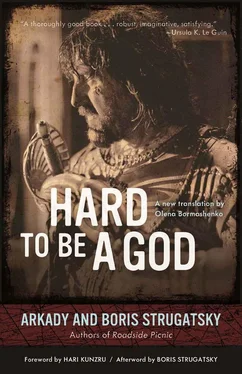“Is it possible,” he thundered again, rotating his bloodshot eyes, “that it’s you, my noble friend? At last I’ve found you!”
“Yes, it’s me,” Rumata said. “Let’s go, my friend, this is no place for you.”
“Beer!” said the baron. “There was beer somewhere around here.” He walked around the chamber, dragging the broken links of his chains and continuing to rumble. “I’ve been running around town for half the night! Goddamn it, I was told that you were arrested, and I beat up a ton of people! I was certain that I’d find you in this prison! Ah, there it is!”
He walked over to the torturer and flicked him off like dust, along with the basin. There turned out to be a barrel beneath the basin. The baron knocked the top out with his fist, lifted the barrel, and turned it upside down over himself, throwing his head back. The stream of beer rushed toward his throat with a gurgle. How lovely, thought Rumata, looking tenderly at the baron. You’d think this is an ox, a brainless ox, but he was looking for me, wanted to save me—he probably came to this prison to find me, by himself. No, there are people in this world, let it be damned… But how well things turned out!
Baron Pampa drained the barrel and hurled it into the corner, where the official was shaking noisily. A squeak came from that direction.
“There we go,” the baron said, wiping his beard with his hand. “Now I’m ready to follow you. Is it all right that I’m naked?”
Rumata looked around, walked over to the torturer, and shook him out of his apron. “Take this for now,” he said.
“You’re right,” the baron said, tying the apron around his loins. “It would be awkward to come to the baroness naked.”
They came out of the chamber. Not a single person dared get in their way—the corridor kept emptying out for twenty paces in front of them.
“I’ll destroy them all!” the baron roared. “They occupied my castle! And they stuck some Father Arima there! I don’t know whose father he is, but I swear by God, his children will soon be orphans. Damn it, my friend, don’t you find that they have amazingly low ceilings? My head is all scratched up.”
They came out of the tower. The spy-bodyguard flashed in front their eyes and ducked back into the crowd. Rumata gave Budach the sign to follow him. The crowd by the gates parted as if split by a sword. You could hear some people shouting that an important state criminal had escaped, and others that “here he is, the Naked Devil, the famous Estorian torturer and mutilator.”
The baron went out onto the middle of the square and stopped, squinting from the sunlight. They had to hurry. Rumata quickly looked around.
“My horse was around here somewhere,” the baron said. “Hey, you there! A horse!”
There was a commotion at the hitching post where the Order’s horses were tied up.
“Not that one!” barked the baron. “The other one—the dapple gray!”
“In the name of the Lord!” Rumata called out belatedly. He started pulling the sling with his right sword over his head.
A scared little monk in a soiled cassock brought the baron the horse.
“Give him something, Don Rumata,” the baron said, climbing heavily into the saddle.
There were shouts of “Stop, stop!” by the tower. Monks were running across the square, brandishing clubs. Rumata thrust his sword at the baron.
“Hurry up, Baron,” he said.
“Yes,” said Pampa. “I must hurry. This Arima will plunder my cellar. I’m waiting for you tomorrow or the day after, my friend. What should I convey to the baroness?”
“Kiss her hand for me,” Rumata said. The monks were already very close. “Faster, faster, Baron!”
“But you are safe?” the baron asked anxiously.
“Yes, damn it, yes! Onward!”
The baron urged his horse into a gallop, aiming right at the crowd of monks. Someone fell down and rolled, someone squealed, there was a cloud of dust and a clatter of hooves on the flagstones—and the baron was gone. Rumata was looking into the alley where some passersby who had been knocked off their feet were sitting, dazedly shaking their heads, when an insinuating voice said in his ear, “My noble don, don’t you think that you’re allowing yourself too much?”
Rumata turned around. Don Reba, smiling somewhat tensely, was looking narrowly at him.
“Too much?” Rumata repeated. “I don’t know the meaning of these words—‘too much.’” He suddenly remembered Don Sera. “And anyway, I see no reason why one noble don can’t help another one in trouble.”
Riders with their pikes at the ready galloped past them heavily—in pursuit. Something changed in Don Reba’s face. “All right,” he said. “Let’s not talk about that… Oh, I see the highly learned Doctor Budach is here. You look wonderful, Doctor. I’m going to have to inspect my prison. State criminals, even ones who have been released, shouldn’t walk out of prison—they should be carried out.”
Doctor Budach lunged at Don Reba, as if blinded by hatred. Rumata quickly stood between them. “By the way, Don Reba,” he said, “what’s your opinion of Father Arima?”
“Father Arima?” Don Reba raised his eyebrows high. “An excellent soldier. Occupies a prominent position in my diocese. Why, what about him?”
“As a loyal servant of Your Grace,” Rumata said with an acute malicious joy, bowing, “I hasten to inform you that you should consider this prominent position vacant.”
“But why?”
Rumata looked into the alley, where the yellow dust hadn’t yet dissipated. Don Reba also looked in that direction. A worried expression appeared on his face.

It was long after midday when Kira invited her noble lord and his highly learned friend to the table. Doctor Budach, after bathing, changing into clean clothes, and carefully shaving, looked very impressive. His movements turned out to be slow and dignified; his intelligent gray eyes peered out benevolently and even indulgently. First of all, he apologized to Rumata about his outburst at the square. “But you have to understand,” he said. “This is a terrible man. A werewolf who only came into this world by an oversight of God. I’m a doctor, but I’m not ashamed to admit that if I had the chance I would have gladly put him to death. I have heard that the king was poisoned. And now I understand what he was poisoned with.” Rumata pricked up his ears. “This Reba showed up in my chamber and demanded that I make up a poison for him that worked in the course of a few hours. Naturally, I refused. He threatened me with torture—I laughed in his face. Then the villain called to the torturers, and they brought in a dozen boys and girls no older than ten years of age from the street. He lined them up in front of me, opened my potion bag, and declared that he would try all the potions on those children in a row until he found the right one. That’s how the king was poisoned, Don Rumata.”
Budach’s lips began to twitch, but he managed to control himself. Rumata, tactfully turning away, nodded. I understand, he thought. I understand everything. The king wouldn’t have even taken a pickle from his minister’s hands. So the scoundrel snuck in some charlatan to the king, promising him the title of healer for curing the king. And I understand why Reba was so thrilled when I exposed him in the king’s bedchamber: it’s hard to think of a more convenient way to sneak in the false Budach to the king. All the responsibility fell on Rumata of Estor, the Irukanian spy and conspirator. We’re babes in arms, he thought. The Institute should introduce a course dealing specifically with feudal intrigue. And proficiency should be measured in rebas. Better yet, in decirebas. Although even that’s too much.
Читать дальше













